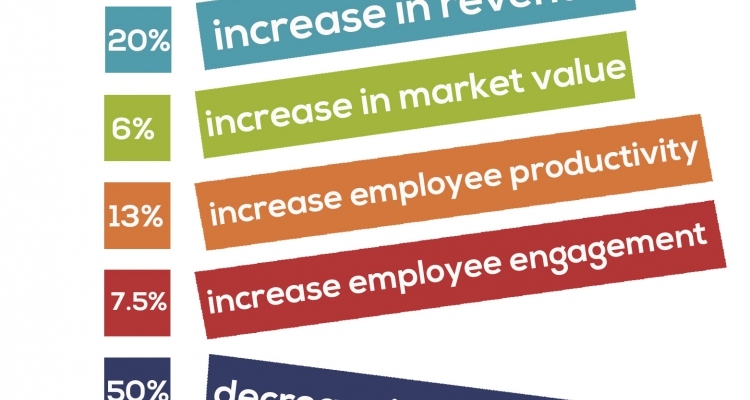CSR is defined by the European Commission as “the responsibility of enterprises for their impacts on society”. Enterprises “should have in place a process to integrate social, environmental, ethical human rights and consumer concerns into their business operations and core strategy in close collaboration with their stakeholders”.
Simply put, CSR focuses on the company’s triple bottom line through evaluating their social, environmental and economic performance and shows that businesses gain by identifying shared opportunities in these three areas.
Research done by Goldman Sachs from 2007-2013 showed that companies that are leaders in environmental, social and good governance policies are financially outperforming their less sustainable peers – by an average of 43%. These enterprises have a four times higher growth rate and eight times higher increase in employees. These 50 studies prove CSR works. Plus, the Dow Jones Sustainability Index shows these companies perform an average of 36.1% better than the ones in the traditional Dow Jones Index (International Finance Corporation).
CR helps to cut costs
By improving business processes in the environmental area, community, marketplace and workplace, the operational efficiency will increase. This will achieve lower gas and electricity bills, waste reduction and decrease in water consumption, efficient use of energy and recycling. Activities in the area of CSR also increase employee motivation and creativity, which leads to innovations, increased work productivity and reduced employee absenteeism due to illness.
CR helps increase profit
Client and consumer demand for more sustainable products is growing and more consumers want to buy products that have been manufactured in a socially responsible way: no child labour, animal testing or environmentally damaging components. The challenge lies in the fact that consumers are not willing to pay much extra for this. A strategic approach to CSR can thus lead to innovative, alternative products and new markets. For example, turning waste into renewable energy or products, and the overall increase in the quality of products and services.
CR can help improve image
If a company commits to CSR and its activities are well communicated, it leads to increased trust in the company, higher employee pride in belonging to it and a good internal image, which then translates into a positive external image. Disclosing CSR information says something about the general well-being of the company, but financial figures alone are not an adequate barometer of viability. CSR helps a company gain a competitive advantage and present itself as a responsible employer. For example, by hiring employees from disadvantaged backgrounds, or undertaking charity work.
CR is here to stay
The EU announced that large companies must disclose their CSR by 2017. A growing number of them are thus taking the lead in supply chain management and demanding a CSR framework from suppliers – this means small and middle-sized enterprises are becoming exposed to social responsibility. Increasing resource scarcity has forced companies to start thinking about alternative materials and manufacturing methods. In addition, consumers are becoming increasingly critical and have their requirements. Interest groups are calling for boycotts and local governments are tightening environmental regulations and reducing CO2 emissions limits.

